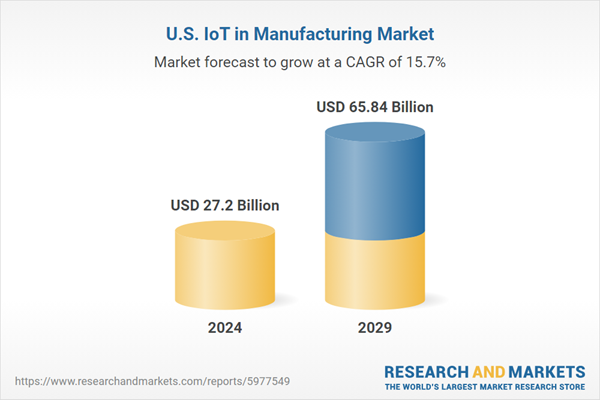Dublin, June 20, 2024 (GLOBE NEWSWIRE) -- The "United States IoT in Manufacturing Market, By Region, Competition, Forecast and Opportunities, 2019-2029F" report has been added to ResearchAndMarkets.com's offering.
United States IoT in Manufacturing Market was valued at USD 27.2 billion in 2023 and is anticipated to project robust growth in the forecast period with a CAGR of 15.7% through 2029F
The United States IoT in Manufacturing Market is experiencing significant growth as the convergence of technology and manufacturing processes transforms the industry landscape. The adoption of Internet of Things (IoT) solutions in manufacturing has gained momentum, driven by a compelling need for enhanced operational efficiency, real-time data analytics, and the optimization of production processes.
IoT technologies, including sensors, connected devices, and data analytics platforms, enable manufacturers to monitor equipment performance, predict maintenance needs, and streamline supply chain operations. This not only leads to cost savings but also enhances product quality and production capacity. Moreover, the market is witnessing increased investment in smart factories and Industry 4.0 initiatives, driving innovation and creating new business opportunities. With a robust ecosystem of IoT providers, a skilled workforce, and a strong manufacturing base, the United States is poised to continue its leadership in the IoT in Manufacturing Market, fostering sustained growth and competitiveness in the global manufacturing landscape. 
Key Market Drivers
Improved Operational Efficiency
- Impact: IoT technologies optimize production processes, reduce waste, and enhance resource utilization in manufacturing.
- Relevance: Real-time insights enable predictive maintenance, minimize downtime, and support data-driven decision-making, ensuring smooth production flow and competitiveness.
Enhanced Product Quality
- Impact: Real-time monitoring via IoT ensures adherence to strict quality standards, triggering immediate adjustments to maintain product excellence.
- Relevance: Critical for industries like automotive and pharmaceuticals, IoT-driven quality control minimizes defects, boosts customer satisfaction, and mitigates recall risks.
Supply Chain Optimization
- Impact: IoT provides real-time visibility across the supply chain, optimizing inventory management, logistics, and transportation.
- Relevance: Enables predictive maintenance for logistics, enhances efficiency, reduces costs, and supports informed decision-making in demand forecasting and route optimization.
Industry 4.0 Initiatives
- Impact: Integration of digital technologies (IoT, AI, big data) in manufacturing transforms operations into agile, data-driven "smart factories."
- Relevance: Facilitates customization, waste reduction, and responsiveness to market demands, positioning U.S. manufacturers competitively on a global scale.
Technological Ecosystem and Skilled Workforce
- Impact: Robust ecosystem supports access to advanced IoT solutions; skilled workforce accelerates adoption and integration.
- Relevance: Collaboration between technology providers and manufacturers fosters innovation, drives technological advancements, and ensures effective IoT implementation.
Key Market Challenges
Data Security and Privacy Concerns
- Challenge: Increasing vulnerability to cyberattacks and data breaches as IoT adoption grows.
- Impact: Threatens intellectual property, disrupts production, and raises privacy concerns, necessitating stringent cybersecurity measures and regulatory compliance.
Integration Complexity
- Challenge: Retrofitting legacy systems with IoT devices is complex, costly, and requires compatibility assurance.
- Impact: Delays in deployment, potential operational disruptions, and increased costs hinder widespread IoT adoption in manufacturing.
High Initial Investment Costs
- Challenge: Significant upfront costs for IoT hardware, software, connectivity, and cybersecurity infrastructure.
- Impact: Especially burdensome for smaller manufacturers, barriers to entry limit adoption, requiring incentives and financing options to promote broader uptake.
Talent Shortages and Workforce Skills
- Challenge: Shortage of skilled professionals adept in IoT, data analytics, and cybersecurity for manufacturing.
- Impact: Limits effective implementation and maintenance of IoT solutions, highlighting the need for workforce development initiatives and industry-academic partnerships.
Key Market Trends
Increased Adoption of Predictive Maintenance
- Trend: IoT-driven predictive maintenance monitors equipment condition in real-time, optimizing maintenance schedules and reducing downtime.
- Impact: Enhances operational efficiency, prolongs equipment lifespan, and reduces maintenance costs, driving market growth in predictive maintenance solutions.
Expansion of IoT Ecosystem Partnerships
- Trend: Collaborations between manufacturers, IoT solution providers, and cloud services for integrated end-to-end solutions.
- Impact: Streamlines IoT adoption, enhances solution capabilities, and supports comprehensive digital transformation in manufacturing.
Integration of Artificial Intelligence and Machine Learning
- Trend: AI and ML enhance IoT capabilities for real-time data analysis, pattern recognition, and decision-making.
- Impact: Enables data-driven insights, process optimization, and autonomous manufacturing, fostering agility and competitiveness in the market.
Demand for Sustainable and Eco-Friendly Manufacturing
- Trend: IoT supports environmental sustainability by monitoring energy consumption, emissions, and resource usage.
- Impact: Aligns with regulatory requirements, enhances corporate social responsibility, and meets consumer preferences for eco-friendly products, driving adoption of sustainable practices.
Customization and Flexible Manufacturing
- Trend: IoT enables rapid reconfiguration of production processes to accommodate varied product specifications.
- Impact: Supports just-in-time manufacturing, enhances responsiveness to market demands, and meets consumer preferences for personalized products.
Segmental Insights
- Component Insights: Software dominates with applications in data analytics, IIoT platforms, and connectivity solutions, pivotal for operational optimization and decision-making in manufacturing.
- Regional Insights: The Midwest leads with its strong manufacturing base, infrastructure, and focus on modernization, driving significant IoT adoption across diverse industrial sectors.
Key Market Players
- IBM Corporation
- Cisco Systems, Inc.
- Microsoft Corporation
- Intel Corporation
- Siemens Corporation
- General Electric Company
- Honeywell International Inc.
- Schneider Electric SE
- Rockwell Automation, Inc.
- PTC Inc.
For more information about this report visit https://www.researchandmarkets.com/r/enymxw
About ResearchAndMarkets.com
ResearchAndMarkets.com is the world's leading source for international market research reports and market data. We provide you with the latest data on international and regional markets, key industries, the top companies, new products and the latest trends.
Attachment
